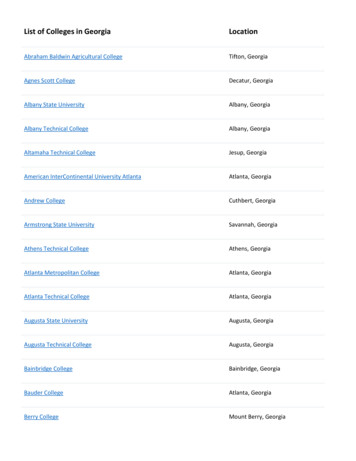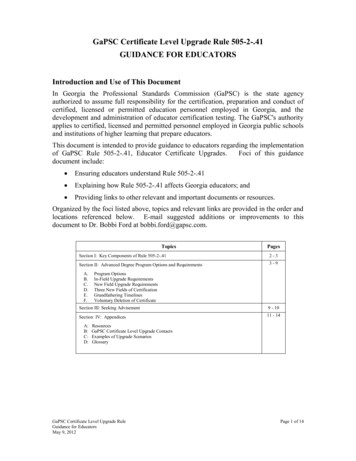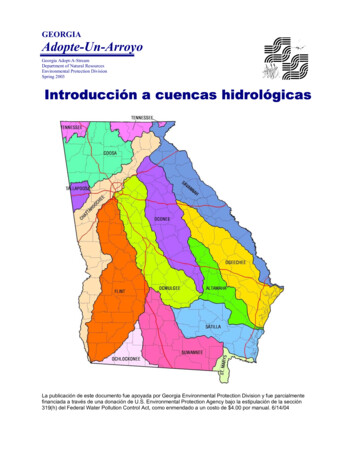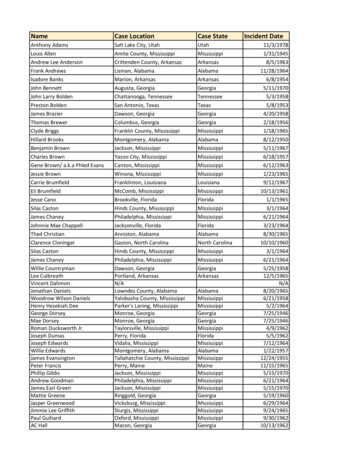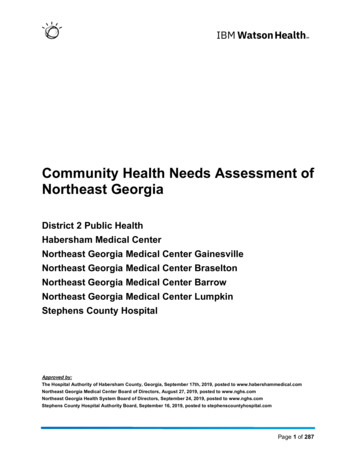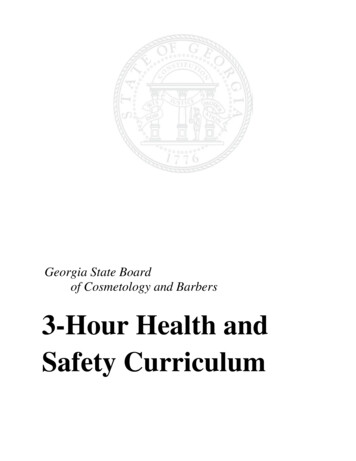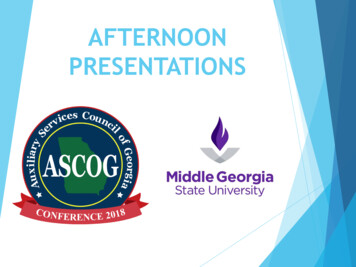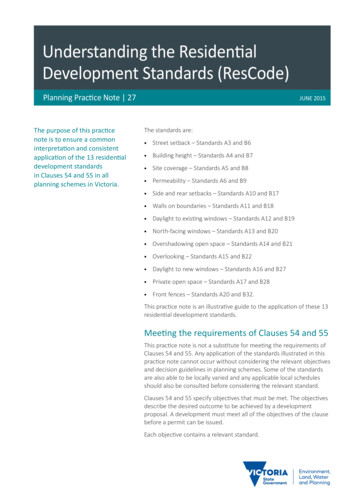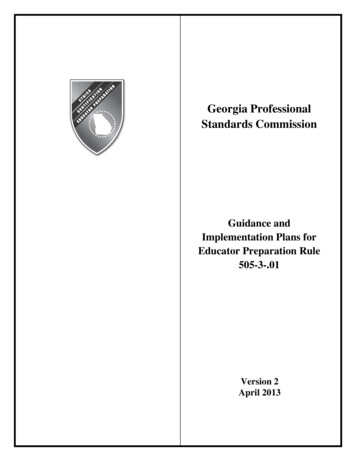
Transcription
Georgia ProfessionalStandards CommissionGuidance andImplementation Plans forEducator Preparation Rule505-3-.01Version 2April 2013
Table of ContentsI.Introduction . 3Rule 505-3-.01 Task Force and Contributing Authors . 4Purpose and Intended Uses . 6Accessing Revised Versions and Other Resources. 6II.New Terminology . 7III.Guidance and Implementation Timelines/Phases for Rule Changes or Additions:A. GaPSC Approval Requirements, Procedures, and Commission Actions1. Approval Prior to Program Start . 82. Approval Review Process Start Prior to Governing Board Approval . 113. GaPSC Decision Options and Consequences for Rule/Policy Violations . 124. Out-of-State Program Provider Requirements . 13B. Ethics5. Georgia Code of Ethics for Educators (teaching and assessing in programs) . 16C. Clinical Practice, Field Experiences, and Partnerships . 196. Clinical Practice Requirements . 197. Field Experiences (new definition) . 208. Field Experience Requirements for Birth Through Kindergarten Programs . 239. P-12 Partnerships (new definition) . 25D. National Standards10. Converting from the GA Framework for Teaching to the InTASC Standards . 2811. Preparing Teacher Candidates to Teach any State-Mandated Curriculum (CCGPS) . 29E. Recommending for Certification Five or More Years after Completion . 31F. Technology13. Preparing Teacher Candidates to Teach in a Distance Learning Environment . 3214. Use of Technology in Field and Clinical Experiences . 32G. Testing15. Readiness for State Content Assessment (GACE) . 33IV.Notifying the GaPSC of Substantive Changes Resulting from Rule Changes . 36V.Appendices:A. Links to Rule 505-3-.01 and the Georgia Code of Ethics for Educators . 37B. Quick Reference Guide – Summary of Implementation Dates . 38C. GaPSC Approval Decision Options. 39D. Template for Substantive Change Report . 47E. Link to NCATE Standards for Professional Development Schools . 49NEWF. Summary of Version Updates. 50
I.IntroductionGeorgia Professional Standards Commission (GaPSC) Educator Preparation Rule 505-3-.01REQUIREMENTS AND STANDARDS FOR APPROVING PROFESSIONAL EDUCATION UNITS AND EDUCATORPREPARATION PROGRAMS establishes the requirements and standards for all entities and programs thatprepare educators for Georgia educator certification. The revised rule, effective January 15, 2013,includes a number of significant changes and additions impacting the design and operation of all GaPSCapproved program providers and educator preparation programs. Changes can be broadly categorizedas follows: GaPSC Approval Requirements, Procedures, and Commission ActionsEthicsBirth-12 Partnerships and Field and Clinical ExperiencesNational StandardsRecommendation for CertificationTechnologyTestingThe amended rule reflects an emphasis on stronger partnerships among program providers and localschools, aimed at creating reciprocal relationships whereby educators are prepared for their roles inmore authentic ways through practical and rigorous field and clinical experiences. In this clinicalapproach to educator preparation, pre-service educators learn to teach or lead in real and authenticsettings under the guidance of seasoned educators; practicing educators benefit from frequentcollaboration and professional learning opportunities with program provider faculty; and schools have amore substantial role in preparing their future workforce. Rule 505-3-.01 also requires a strongeremphasis on teaching and assessing knowledge and attitudes related to educator ethics, setsexpectations for preparing educators to teach in a distance learning environment, and requires programproviders to incorporate in their programs the InTASC Model Core Teaching Standards published in 2011by the Council of Chief State School Officers. InTASC standards set high expectations for the preparationof teachers, shifting the focus of preparation to the learner and the actions of the teacher which mostpositively impact learning. These 2011 standards are nationally recognized as representative of themost currently accepted best practices in teaching and learning. It is anticipated that the changesincluded in the 2013 amendment of Rule 505-3-.01 will significantly improve the preparation ofeducators and eventually result in not only more synergistic relationships among all B-20 educators inGeorgia but also in improved student achievement.GaPSC Rule 505-3-.01 Guidance DocumentVersion 2April 2013Page 3 of 50
Rule 505-3-.01 Task Force and Contributing AuthorsGaPSC Educator Preparation staff wish to recognize and thank the individuals listed below for theirservice on the task force and committees responsible for recommending amendments to Rule 505-3-.01and for developing supporting documents aimed at assisting program providers as they implement rulechanges. The core members of the task force began working to develop rule changes in November2010. The task force was expanded in the summer of 2012 to include three committees and an advisorygroup. All but three members of the original task force have continued to serve through 2012 and into2013, lending their time and expertise on one or more of the committees charged with developingguidance documents, implementation plans, or supporting documents. Members of the GuidanceCommittee and the Implementation Plan Committee developed the majority of the content found in thisdocument. Georgia Framework for Teaching Committee and Advisory Group members are developingthe Georgia Model Teaching Progressions, a tool aimed at supporting the implementation of the InTASCModel Core Teaching Standards in preparation programs and P-12 schools.We are extremely grateful for the dedication and excellent work of each person listed below. Eachplayed an important role in helping us revise the rule and create accompanying documents which webelieve will improve the preparation of educators in our state and ultimately lead to improvements inteaching and learning.Core Task Force Members:Dr. Ruth Caillouet, Clayton State UniversityDr. Judy Carter, Fort Valley State UniversityDr. Angela Coleman, University System of GeorgiaDr. Bob Cummings, Piedmont CollegeDr. Debbie Gober, Columbus State UniversityDr. Susan Malone, Mercer UniversityDr. Kim Metcalf, University of West GeorgiaDr. Bob Michael, University of North GeorgiaDr. Linda Noble, University System of GeorgiaDr. Deborah Thomas, Georgia Southern UniversityDr. Steven Thomas, Formerly of Paine CollegeDr. Judi Wilson, Georgia Regents UniversityGuidance Committee Members:Dr. Ruth Caillouet, Clayton State UniversityDr. Maryellen Cosgrove, Gainesville State CollegeDr. Donna Gardner, Toccoa Falls CollegeDr. Kim Metcalf, University of West GeorgiaMs. Nikki Mouton, Gwinnett County Public SchoolsImplementation Plan Committee Members:Dr. Judy Carter, Fort Valley State UniversityDr. Angela Coleman, University System of GeorgiaMs. Beth Johnston, North Georgia RESADr. Susan Malone, Mercer UniversityDr. Leigh Ann Putman, Metropolitan RESADr. Deborah Thomas, Georgia Southern UniversityDr. Judi Wilson, Georgia Regents UniversityGaPSC Rule 505-3-.01 Guidance DocumentVersion 2April 2013Page 4 of 50
Georgia Framework for Teaching Committee Members:Dr. Angela Coleman, University System of GeorgiaDr. Angie Gant, Truett-McConnell CollegeDr. Debbie Gober, Columbus State UniversityMs. Susan Jacobs, Georgia Department of EducationMs. Carlene Kirkpatrick, Georgia Department of EducationDr. Ann Levett, Middle Georgia State CollegeMs. Qualyn McIntyre, Atlanta Public SchoolsDr. Janice McLeroy, Northeast Georgia RESAMs. Kathie Monti, Georgia Department of EducationMs. Rhonda Powers, Okefenokee RESAGeorgia Framework for Teaching Advisory Group Members:Mr. Sandy Addis, Pioneer RESADr. Deborah Bembry, Albany State UniversityMr. Ron Bryant, Heart of Georgia RESADr. Cindi Chance, Georgia Regents UniversityDr. Arlinda Eaton, Kennesaw State UniversityMs. Karen Faircloth, Northwest Georgia RESAMs. Laura Frizzell, Coastal Plains RESADr. Judy Godfrey, Bibb County SchoolsDr. Sandy Leslie, Brenau UniversityDr. Don Livingston, LaGrange CollegeDr. Joyce Many, Georgia State UniversityDr. Jim Marshall, University of GeorgiaMs. Iris Mathis, Lowndes County SchoolsMs. Diane Ray, PAGEDr. Melissa Roland, Chattahoochee-Flint RESAMs. Sandra Schwellinger, GAEDr. Andrew Smith, Cobb County SchoolsMs. Robin Smith, Middle Georgia RESAMs. Rachel Spates, West Georgia RESADr. Sean Warner, Clark Atlanta UniversityDr. Jeffrey Wilson, White County SchoolsMs. Kelly Young, Southwest Georgia RESAGaPSC staff members contributing to the work of the Task Force and the development of this documentinclude:Dr. Bobbi FordDr. David M. HillMs. Penney McRoyMs. Phyllis S. PayneMs. Anne Marie FentonDr. Chuck McCampbellGaPSC Rule 505-3-.01 Guidance DocumentVersion 2April 2013Page 5 of 50
Purpose and Intended UsesThis document was developed jointly by GaPSC staff members and representatives of Georgia programproviders as a means of assisting all providers in: interpreting new terms and the language of the rule, understanding the implications of rule changes/additions as they relate to program design anddelivery, and planning for implementation of immediate and long-term procedural and programmaticchanges.Sections of this document address each substantial rule change or addition, and each section includes: rule references,relevant definitions,implementation timelines,if applicable, suggested phases of implementation, andguidance for interpreting the rule change or new requirement.Program providers are encouraged to consider this document an important guide for understandingGaPSC expectations, and for planning and implementing rule changes impacting all preparationprograms. Implementation timelines should be considered required; for instance, some changes takeeffect immediately, while others may be phased in over time. The implementation timelines indicatewhen GaPSC staff will expect full implementation and when BOE teams will expect to find evidence ofimplementation (see Appendix A: Quick Reference Guide—Summary of Implementation Dates).Guidance related to program design and delivery is not intended to be mandatory; however, variancesshould be justifiable.Accessing Revised VersionsRule 505-3-.01 Guidance Documents and other resources may be accessed from the GaPSC websitepages dedicated to providing resources for program providers. The resource pages are located es/Home.aspx. Expand the Resources menu onthe left margin navigation pane to select the appropriate program provider type. Document footers willindicate the latest revision date.GaPSC Rule 505-3-.01 Guidance DocumentVersion 2April 2013Page 6 of 50
II.New TerminologyRule 505-3-.01 contains a glossary of over twenty terms used throughout the rule and in other relateddocuments. Of the definitions provided in the rule, five are worthy of additional explanation. Three areincluded here; the new definitions of field experiences and partnerships are addressed in the guidancesection of this document.1. Council for the Accreditation of Educator Preparation (CAEP): The national accreditationorganization formed as a result of the unification of NCATE (see definition (o)) and the TeacherEducation Accreditation Council (TEAC). CAEP is an association governed by the educationprofession and by others who have a stake in the outcomes of professional educator preparationprograms. Upon completion of the unification process, CAEP will be recognized as the single,national accreditor of education program providers.As an NCATE partner state, Georgia will develop a partnership with CAEP and transition, overtime, to all applicable CAEP standards, approval review procedures, and policies. Although allGeorgia program providers are not required to seek and maintain national accreditation, theGaPSC will continue its current practice of applying the same standards to all program providers.As Rule 505-3-.01 was being revised, the transition from NCATE to CAEP was not yet complete;therefore, the rule contains references to both NCATE and CAEP. In future revisions of the ruleadjustments will be made to reflect the current status of Georgia’s partnership with the nationalaccreditor.2. Education Program Provider(EPP): The institution of higher education (IHE), college, school,department, agency, or other administrative body with the responsibility for managing orcoordinating all programs offered for the initial and continuing preparation of teachers andother school personnel, regardless of where these programs are administratively housed(formerly referred to as the professional education unit).The term Education Program Provider (EPP) emerged as NCATE began the transition to formCAEP. It is intended to be more inclusive of various types of program providers. As we haveseveral types of program providers in Georgia (non-profit organizations/associations, localeducation agencies, RESAs, and institutions), we decided to adopt this change of terminologyand incorporate the new term in Rule 505-3-.01. You will see the term education programprovider, or the acronym EPP, used in place of the term professional education unit, or unit,throughout the rule and this document.3. Other potentially unfamiliar terms you will notice in this document are B-12 or B-20, used inplace of P-12 or P-20. We replaced Pre-school (P) with Birth (B), to recognize and include in ourrange of partners, educators and providers serving children from birth through age 5.GaPSC Rule 505-3-.01 Guidance DocumentVersion 2April 2013Page 7 of 50
III.Guidance and Implementation Timelines/Phases for Rule Changes orAdditionsA.GaPSC Approval Requirements, Procedures, and Commission Actions1.Approval Prior to Program StartRule Statements and ReferencesThe education program provider must be approved by the GaPSC before candidates areformally admitted to educator preparation programs. Rule 505-3-.01, paragraph (3) (c) 5.Educator preparation programs shall be approved by the GaPSC before candidates areadmitted and begin program coursework. Rule 505-3-.01, paragraph (3) (e) 1.Implementation(1) Timeline:Full implementation is expected immediately, as of the rule effective date of January15, 2013, for all program providers.(2) Definition:Full implementation means starting January 15, 2013, program providers must seekand gain GaPSC approval of the education program provider and/or preparationprograms before candidates are formally admitted to and begin taking courses ineducator preparation programs. Prospective candidates may submit applications forprogram admission and institutions may process those applications prior to programapproval.GuidanceUpdated Rule 505-3-.01 stipulates that no program may admit candidates until both the EPPand the program have been granted at least Developmental Approval. While this was implicitin the past, it is made explicit in the updated Rule.(1)What/who is the EPP?According to Rule 505-3-.01, the Education Program Provider is defined as, “Theinstitution, college, school, department, agency, or other administrative body with theresponsibility for managing or coordinating all programs offered for the initial andcontinuing preparation of teachers and other school personnel, regardless of wherethese programs are administratively housed.”(2)What is Developmental Approval?As per Decision Options adopted by the PSC in July, 2012, Developmental Approvalindicates that a new Education Program Provider and/or proposed educatorpreparation programs have been deemed by the PSC to meet all or most of the eightGaPSC Rule 505-3-.01 Guidance DocumentVersion 2April 2013Page 8 of 50
Georgia Standards. Developmental Review/Approval is the first step in the longer termprocess of securing and maintaining Continuing Approval.(3)What does the term “approval” mean in this context?For new Education Program Providers or programs, the results of the DevelopmentalReview process can be of three types.i.ii.iii.Developmental Approval indicates that the program or EPP has met all eightGeorgia Standards, although areas for improvement may be identified. Programsor EPPs being granted Developmental Approval may begin admitting candidatesand offering the program, and they are next subject to Initial Performance Reviewwithin three years.Provisional Approval indicates that the program or EPP has failed to meet one ormore of the eight Georgia Standards. Programs or EPPs being granted ProvisionalApproval may begin admitting candidates and offering the program, but they willbe required to satisfy particular provisions within a specified period of time.Denial of Approval indicates that the program or EPP “does not meet one or moreof the Georgia Standards and has pervasive problems.” Programs being deniedapproval may not begin admitting candidates or offering programs.Program or EPP approval status is not official until the Commission formally votes onthe approval action. As a result, no program may admit candidates until the programand/or EPP have been approved formally by Commission vote.(4)What does “program start” mean?By this rule, the start of a new program (or EPP’s operation) is defined as the point atwhich candidates are admitted to the program (or EPP) requesting approval. UpdatedRule 505-3-.01 prohibits programs or EPPs from admitting candidates (i.e., “starting”)until Developmental Approval has been granted.(5)When/at what point do candidates apply?Prospective candidates may apply to the new program or EPP during the period whenapproval is under consideration and before the program or EPP is formally grantedDevelopmental Approval. However, no candidate may be granted admission to thenew program or EPP until formal approval is granted. In such cases, applyingcandidates should be carefully and clearly made aware that the program to which theyare applying has not yet been approved by the Georgia Professional StandardsCommission, and they will not be admitted until such approval is obtained.(6)When should the planning process for Developmental Review begin?i.Prior to revision of Rule 505-3-.01, the process of Developmental Review beganone year (two semesters) prior to the semester during which the program or EPPintended to begin. However, the revised rule requires that the process begin atleast two years (four academic semesters) prior to the anticipated program or EPPstart date. The process is initiated by submission of the Intent to Seek Approvalform (available at GaPSC - Resources for program es/Home.aspx).GaPSC Rule 505-3-.01 Guidance DocumentVersion 2April 2013Page 9 of 50
ii.Thorough preparation during this phase of process is critical to the success of theReview and of the future of the program and/or EPP. During this phase, severalfactors must be considered and their solutions addressed. Among these are:a) What budget will be necessary to support the program/EPP’s operation andhow will these resources be ensured?b) How will faculty for the program be provided? Will existing faculty membersbe reassigned to the program, or will additional/new faculty members berequired? If existing faculty will be reassigned, how will their formerresponsibilities be addressed?c) Is the program/EPP viewed by all stakeholders as valid and rigorous? Were B12 and other partners engaged in the development of the program/EPP andare their perspectives clearly reflected? Have members of the professionaleducation community reviewed the proposed program and has their feedbackbeen addressed?d) Has buy-in from higher level administrators been established for theprogram/EPP? Do they clearly understand the need for the program, thestructure and functioning of the program, and how the program/EPPcontributes to the larger goals and mission of the organization? Have theyformally committed to provide the resources that will be required toeffectively offer the program?(7)What is the approval process timeline?The approval process for Developmental Review of a new EPP is a two year processwhich starts with the provider submitting an Intent to Seek Approval Form (ISA). Oncethe GaPSC receives the ISA an Education Specialist (ES) is assigned to the provider. TheES works closely with the provider to develop a timeline for submitting all the requireddocuments and reports such as the Preconditions Report which is due three semestersbefore the visit; the Program Reports which are due one year prior to the visit; and theInstitution Report and Exhibit Room which are due a minimum of two months beforethe visit.GaPSC Rule 505-3-.01 Guidance DocumentVersion 2April 2013Page 10 of 50
2.Approval Review Process Start Prior to Governing Board ApprovalRule Statements and ReferencesAn education institution or agency’s education program provider (e.g.college/school/department of education), and/or program(s) shall be approved by itsgoverning board prior to seeking GaPSC approval for the first time (Developmental Approval).Rule 505-3-.01, paragraph (3) (c) 1.A GaPSC-approved education program provider seeking approval to add new preparationprograms may submit the programs for GaPSC approval prior to receiving governing boardapproval, as long as governing board approval is granted thirty (30) days prior to thescheduled pre-visit. Rule 505-3-.01, paragraph (3) (d) 2.Implementation(1) Timeline:Full implementation is expected immediately, as of the rule effective date of January15, 2013, for all program providers.(2)Definition:Full implementation means starting January 15, 2013, program providers may submitthe Intent to Seek Approval Form and begin the GaPSC approval review process prior toreceiving formal approval by the governing board (i.e. USG Board of Regents, LEASchool Board, RESA Board of Control, etc.). Preparations for the GaPSC approvalreview process, to include the submission of program reports (PRS) may continue aslong as a letter indicating formal governing board approval is received thirty (30) daysprior to the scheduled Pre-visit. The Pre-visit typically occurs 45 to 60 days prior to theon-site or electronic approval review.GuidanceUntil this amendment, Rule 505-3-.01 required approval by the EPP’s appropriate governingboard prior to initiating the Developmental Review Process, indicating, “An educationagency’s degree(s), Education Program Provider, and/or program(s) shall be approved by itsgoverning board prior to seeking Professional Standards Commission Approval.” However,the updated rule allows program providers to begin the Developmental Review Process for anew program prior to formal approval by the governing board.(1) Can the Intent to Seek Approval form be submitted before a letter is available indicatingthe EPP’s governing board has approved the program? Yes.(2) What can be done prior to securing governing board approval?Several specific tasks can be completed while governing board approval is in process.For example:i.The tentative dates for on-site review may be established.ii.Program/EPP budgets can be prepared.GaPSC Rule 505-3-.01 Guidance DocumentVersion 2April 2013Page 11 of 50
iii.iv.v.The program report or reports may be developed (PRS) by the EPP.Evidence necessary to support the review of the program can be compiled andorganized.The Board of Examiners team may be established and members confirmed.(3) What must be submitted to GaPSC regarding governing board approval?i.A letter documenting governing body approval must be submitted to the GaPSCat least 30 days prior to the pre-visit. This pre-visit is typically scheduled at least45 days prior to the on-site review.ii.It is recommended that each program provider work closely and directly with itsEducation Specialist at the outset of this program development and approvalprocess to establish an appropriate timeline and to identify necessary governingboard approvals to be submitted to the GaPSC.3.GaPSC Decision Options and Consequences for Rule/Policy ViolationsRule Statements and ReferencesEducation agencies seeking GaPSC approval as an education program provider shall follow allapplicable GaPSC policies and procedures, e.g., preconditions to determine eligibility for areview, approval review requirements, cost guidelines, post review requirements,Commission decisions, public disclosure policy, and annual reporting procedures. Out-ofstate institutions accredited by NCATE or CAEP and approved by the GaPSC to recommendprogram completers for Georgia certification in the field of Educational Leadership mustmaintain National Recognition status by the NCATE or CAEP-accepted SpecializedProfessional Association for Educational Leadership programs for the Educational Leadershipprogram(s) offered to Georgia educators and shall follow all applicable GaPSC policies,including, but not limited to, those regarding preparation program effectiveness measures,annual reporting and data submission requirements. In order to maintain approval status,all GaPSC-approved professional education units (including out-of-state providers offeringGaPSC-approved Educational Leadership programs) must comply with all applicable GaPSCrules and policies. Failure by an approved provider to fully comply with GaPSC EducatorPreparation, Certification, and Ethics Rules, Commission approval decisions, or agencyprocedures and/or requirements may result in changes in approval status that could includerevocation of approval. Failure to comply with federal reporting requirements may result infines. Rule 505-3-.01, paragraph (3) (c) 4.Each education program provider approved to offer educator preparation programs shallcomply with all reporting requirements, to include the submission of data related topreparation program effectiveness measures and data required in GaPSC and federal annualreports on the performance of the program provider and all educator preparation programs.Rule 505-3-.01, paragraph (3) (c) 7.GaPSC-approved education program providers seeking approval for preparation programsleading to Georgia educator certification shall follow all applicable GaPSC program approvalpolicies and procedures in effect at the time of the requested approval. Rule 505-3-.01,paragraph (3) (d) 3.GaPSC Rule 505-3-.01 Guidance DocumentVersion 2April 2013Page 12 of 50
Implementation(1) Timeline:GaPSC Approval Decision Options were adopted by the Commission July 12, 2012, andbecame effective September 1, 2012.(2)Definitions:i.Approval is defined in Rule 505-3-.01 as a process for assessing and enhancingacademic and education quality through peer review, to assure the public that aneducation program provider and/or program has met institutional, state, andnational standards of educational quality; also, a Georgia Professional StandardsCommission (GaPSC) decision rendered when an education program provider orprogram meets GaPSC standards.ii.Members of the Georgia Professional Standards Commission EducatorPreparation and Certification Committee, when reviewing approval or relatedrequests have a set of options from which to choose in rendering decisions.These Approval decision options are in three categories: approval reviews,progress reports, changes in national accreditation status and/or failure to meetstandards, and non-compliance with rules, commission decisions, or procedures.GuidanceProgram providers are strongly encouraged to become familiar with the GaPSC ApprovalDecision Options document included in Appendix D. The document describes all the decisionoptions from which Commissioners can choose when rendering an approval decision; theconsequences for late reporting or failure to submit required reports; Commission actionsresulting from changes in national accreditation status or failure to meet standards; andconsequences for non-compliance with agency regulations, decisions, or procedures. EPPsshould also avail themselves of every opportunity to learn about GaPSC reportingrequirements (webinars, meetings, workshops, etc.), and to carefully document and monitorreporting due dates and Commission decision requirements such as Progress Reports. TheProgram Approval Education Specialist assigned to each program provider is therecommended first point of contact for information related to agency regulations,Commission decisions, and unless otherwise indicated, for reporting requirem
Education Accreditation Council (TEAC). CAEP is an association governed by the education profession and by others who have a stake in the outcomes of professional educator preparation programs. Upon completion of the unification process, CAEP will be recognized as the single, national accreditor of education program providers.
